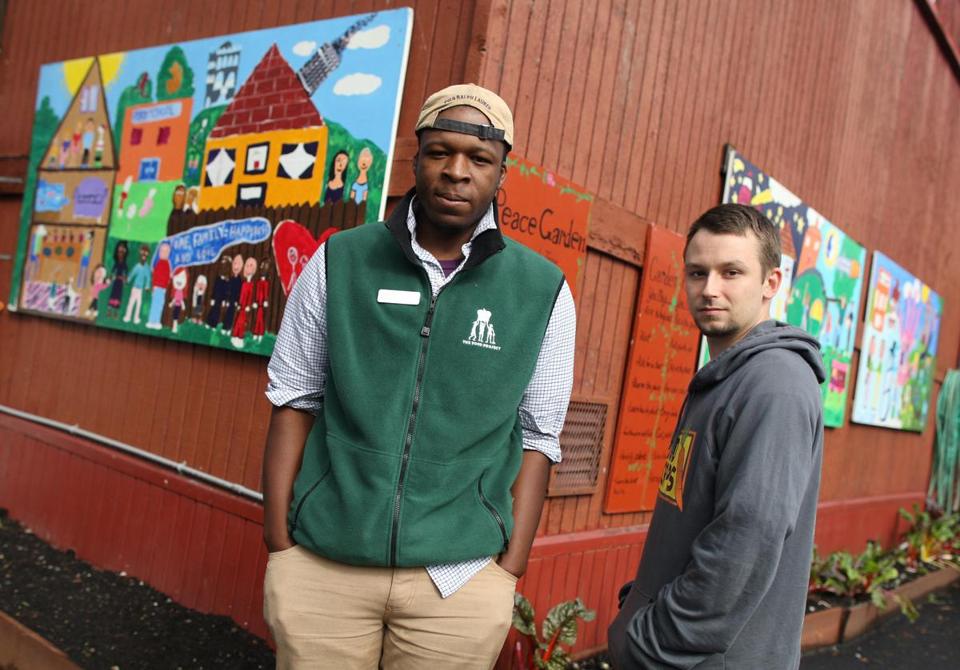One row of vegetables, one row of herbs, one row of community spirit, one row of better school food, one row of good neighborhoods
by Devra First
LYNN – On a recent afternoon, everything is peaceful at the Robert L. Ford School. Students of all colors, religions, and nationalities mingle in the yard. A teacher’s voice drifts from the window, stern and affectionate. But a few buildings away stands a house that was until only recently a center of drug activity. Gang members have burned the equipment in the local playgrounds. The Ford School isn’t just a building with classrooms. It’s an oasis for the community.
This is particularly true of a narrow space beside the school that used to be covered in blacktop, roomy enough for a good game of hopscotch but not much more. In 2008, the Highlands Coalition, a community group, helped turn it into a garden. Now, in the middle of the city, eggplants, tomatoes, and sweet potatoes, grapes and apples, mint and chives flourish. Ginseng and jalapenos reflect the community’s diversity. And as the sky clears up after a rainy morning, fourth- and fifth-graders stream out of the building, ready to spend some time outside.
Waiting for them are Norris Guscott and Andy Harding, best friends since junior high school, now in their early 20s. They are among the first group of participants in FoodCorps, a newly launched national service organization formed to fight the childhood obesity epidemic. It takes a three-pronged approach: providing nutrition education, bringing healthy local food into school cafeterias, and creating and expanding school garden programs like the one in Lynn. An AmeriCorps program, it also receives funding from the W.K. Kellogg Foundation, Woodcock Foundation, Whole Kids Foundation, and others.
The program kicked off in the middle of August and is now working with 41 sites in 10 states. For its inaugural year, FoodCorps received more than 1,200 applications for 50 spots. It hopes to double in size next year. Participants receive a $15,000 stipend for a year of service, room and board not included, an amount that puts members on the same footing as the low-income residents with whom they work. FoodCorps partners with local organizations, or host sites; in Massachusetts, they are Boston Public Schools, CitySprouts, and the Food Project, which works with the Ford School. The state has six service members including Harding and Guscott. Grace Cherubino also works with the Food Project, in Gloucester; Sadie Richards with Boston Public Schools; and Erin Taylor and Sarah Rubin with CitySprouts.
Each week, members fill out thorough reports that allow FoodCorps to measure its impact and figure out what works best. In the first seven weeks of surveying, says cofounder and program director Debra Eschmeyer, participants have reached more than 11,000 kids, built 16 new school gardens, and revitalized 58 existing plots.
The need for organizations like FoodCorps is clear. Eschmeyer says the total annual cost of obesity in the United States is $300 billion. “People don’t reconcile that spending a little extra time and a little extra money on school lunch will pay many times over on future expenses and medical costs,’’ she says. One in three children is “going to be diabetic in their lifetime, something you hear stated over and over by everyone from the Obama administration to health care reports. What they miss is that this could be prevented by fun things: knowledge, engagement, access, kids getting their hands dirty. Fun can actually address serious complications.’’
Fun is certainly happening in the garden in Lynn. Harding high-fives the kids, who rush to harvest bell peppers, the last of the season’s tomatoes, and eggplants, for which they have won prizes at the Topsfield Fair. He and Guscott are genial role models at the center of a swirl of children picking, weeding, watering, playing with worms, and gleefully eating fruits and vegetables they once found totally icky.
“We made salsa for the kids last week,’’ Harding says. “One girl really didn’t want to eat it and wanted nothing to do with any of the plants we put in the salsa. We had her try it. She was like, ‘I didn’t like anything in this bowl, but it was so good!’ Immediately right there, I changed her life.’’
Guscott and Harding understand well the issues facing the students; they grew up in Lynn. Guscott’s family moved here from Dorchester when he was in the seventh grade. He has British and Jamaican roots; visiting England, he learned to play cricket and taught Harding. The two now play in the Massachusetts State Cricket League together. Guscott’s father removes asbestos; his mother is a nurse. They always stressed the importance of education. Guscott attended the University of Massachusetts-Boston, majoring in community psychology. This informs his work with FoodCorps.
“As cliched as it sounds, children are the future,’’ he says. “We want to guide them to eat healthier. I hope to accomplish something longstanding, long after we leave. You can’t have a healthy community without healthy food.’’
Harding, who majors in liberal arts at North Shore Community College, was raised in a family just getting by on government assistance. The crack epidemic hit his childhood neighborhood hard; he couldn’t go out to play because it was too dangerous. “But we were always an optimistic family,’’ he says. “We learned to laugh at things and never take anything for granted. My dad’s the type of guy who would give the shirt off his back even though he didn’t have anything. They raised me well.’’
Harding, Guscott, and their friend Nick Chum would get together and watch documentaries like “Food Inc.’’ and “King Corn,’’ whose producers and stars, Curt Ellis and Ian Cheney, are among FoodCorps’ cofounders. (Chum, who is studying agricultural engineering, is the garden manager at the Ford School but did not apply to FoodCorps.) Then they would discuss and debate the food system. They decided it needed reform. They believed people needed to grow their own fruits and vegetables. They connected with the Highlands Coalition and got involved with the Ford School garden, even before it was a FoodCorps site.
“I thought they were really on the right track,’’ says Highlands Coalition director David Gass. “They were idealistic and community-minded, which is rare. They were discussing high-level stuff, world issues. You’d give them a book to read and they’d read it. Then they’d give you something to read.’’
Now they pass their knowledge along to the kids. Students do about 60 percent of the gardening here. They learn about composting and are proud of how much rainwater they collect and use in the garden. They are helping raise money for a hoop house so they can grow food all year long.
“It would be a victory to one day a week have lunch from the garden,’’ Guscott says. He and Harding make sure students leave the garden with bags of vegetables to take home. “We can’t have long-lasting, deep change without the parents on board.’’
The two appear to be winning hearts, minds, and stomachs already.
“We get very excited to eat things we usually don’t like, like broccoli, spinach, peas, and carrots,’’ says Eva Muraga, 10. “We grew it, so we like it a lot more.’’



